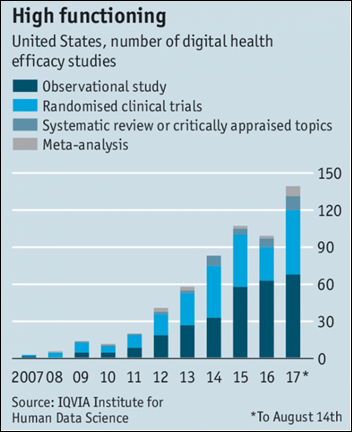Thank you for the mention, Dr. Jayne — we appreciate the callout, the kind words and learning more about the…
Monday Morning Update 2/5/18
Top News
The Economist reviews the number of prescription-only digital health apps that have earned FDA approval or could so more quickly under FDA’s new pre-certification program.
Apps are being approved to actually treat conditions – either alone or in combination with a drug – but investors are watching to see how companies fare since the “who pays” question hasn’t been answered and nobody’s sure how a patients will react to being given an app instead of a pill.
Pear Therapeutics won FDA approval in September 2017 for its ReSet app for substance abuse treatment. Its pipeline includes apps for schizophrenia and post-traumatic stress disorder. The Boston-based company, founded by neuroscientist Corey McCann, MD, PhD, raised $50 million in a Series B funding round last month that increased its total to $70 million.
Reader Comments

From Eloquent Rascal: “Re: Apple Health Records. Does it display any information that patients can’t already see in their EHR portal? Can patients change the information?” A source tells me that, so far anyway, the patient’s phone will show consumers nothing that they can’t already see on the patient portal. Patients can apparently change or hide information, which makes their phone-stored information of limited use to clinicians who may not trust it.
HIStalk Announcements and Requests
My poll tool doesn’t calculate percentages like you might expect when allowing multiple choices, but it’s safe to say that most respondents use their phones for health-related activities. Relatively few, however, use the information contained on it during their provider visit, view their progress notes via OpenNotes (although that obviously requires their hospital to participate), or seek out a video visit.
New poll to your right or here: if you’re going to the HIMSS conference, why?
I received a few responses to What I Wish I’d Known Before … Bringing an Ambulatory EHR Live. Let’s hear what you have to say about the reader-recommended topic of taking a software sales job.
Thanks to the following companies that recently supported HIStalk. Click a logo for more information.
Webinars
February 13 (Tuesday) 1:00 ET. “Beyond Sliding Scale: Closing the Gap Between Current and Optimal Glycemic Management Practices.” Sponsor: Monarch Medical Technologies. Presenter: Laurel Fuqua, BSN, MSN, EVP/chief clinical officer, Monarch Medical Technologies. The glycemic management practices of many hospitals and physician staff differ from what is overwhelmingly recommended by experts and relevant specialty societies. As a result, they are missing an opportunity to improve the quality, safety, and cost of care for their patients with diabetes and hyperglycemia, which commonly represent more than 25 percent of their inpatient population. Hospitals that transition from sliding-scale insulin regimens to consistent use of basal / bolus / correction protocols are seeing reductions in hyperglycemia, hypoglycemia, and costs. Making this shift more effective and efficient is the use of computerized insulin-dosing algorithms that can support dedicated staff using a systematic approach.
February 14 (Wednesday) 2:00 ET. “Time is Money: Aurora Health’s Journey of Implementing and Advancing Cost Accounting.” Sponsor: Strata Decision Technology. Presenter: Patrick Nolan, VP of finance, Aurora Health Care. Aurora Health Care’s implementation of Strata’s Decision Support module involved not only building an improved cost accounting model, but improving the process to engage a cross-functional team in cost development. It now has accurate, consistent cost data to support decision-making. Aurora’s next phase will be to use actual procedure and visit times to allocate costs. This presentation will provide a detailed view into both the implementation and future direction of the Strata Decision Support program within Aurora.
Previous webinars are on our YouTube channel. Contact Lorre for information.
Acquisitions, Funding, Business, and Stock

From the Athenahealth earnings call following positive quarterly results that sent shares up 14 percent Friday:
- CEO Jonathan Bush says the company is seeing a post-HITECH “sugar low” as overall buying demand slacks off. Bookings for the fiscal year didn’t meet the company’s goal.
- The company will change its software release schedule to three times per year following disappointing customer retention numbers.
- 62 hospitals are fully live on its inpatient system.
- 40 percent of customers are exchanging patient records via CommonWell and Carequality. Bush says the they can see hospital CCD information on an application tab, but the next steps involve extracting the most useful information and then developing APIs to allow users to interact directly with a hospital’s EHR.
- The company’s main strategy will be to deepen the number of services offered to mitigate the “micro aggressions against the practice of medicine” and to emphasize its network’s capabilities rather than assuming that offering the best EHR or PM will create demand.
- Bush says the previously “clunky” single, integrated view of inpatient and outpatient patient records view is improving as the company hopes to avoid being “boxed out” in being replaced by a single integrated system such as Epic or Cerner.
- Epocrates continues to turn in poor numbers, although it’s no longer being positioned as a standalone product but instead as a dashboard for other Athenahealth offerings.
- The company spent a lot of money and annoyed doctors as it fought to get a significant share of HITECH-driven business, but now it is transitioning to more thoughtful product offerings.
- Bush says MACRA and MIPS won’t drive sales since practices “get the check something like two years after you make the move and the check is smaller than cable bill.”
- Bush says high-deductible insurance has pushed patients to defer services until later in the year when they’ve met their deductible, with providers and their vendors facing lean first quarters as the new normal.
Sales

In England, Plymouth Hospitals NHS Trust joins the global health research network of TriNetX.
Decisions
- Adirondack Medical Center Saranac Lake (NY) went live with Meditech in November 2017.
- St. Luke’s Gnaden Huetten campus (PA) will switch from Cerner to Epic in June 2018.
- St. Vincent Hospital (PA) will replace McKesson with Epic in February 2018.
These provider-reported updates are supplied by Definitive Healthcare, which offers a free trial of its powerful intelligence on hospitals, physicians, and healthcare providers.
People

Investment syndicate AngelMD hires industry long-timer Michael Raymer (Perspectum Diagnostics) as chief strategy officer.
Government and Politics
A GAO report finds that federal and state governments are spending $10 billion for assisted living services for Medicaid beneficiaries without much oversight or quality monitoring. It concludes that CMS has provided unclear guidance, Congress has not established standards, and states haven’t tracked cases involving neglect or abuse.
Other
Hospitals are being overwhelmed with record-breaking numbers of flu-related ED visits and admissions, to the point that Lehigh Valley Hospital-Cedar Crest (PA) erected a MASH-style “surge tent” in its ED parking lot to hold overflows. Patients housed there who didn’t get a flu shot told the New York Times reporter some bizarre theories that “heard” (meaning that they cluelessly read on Facebook):
- When offered a Tamiflu prescription, “No, I heard it causes hallucinations. I heard about a lady whose daughter got Tamiflu and tried to kill her.”
- “I hear the [flu] shot gives you flu.”
- “I heard you can get Alzheimer’s from it — that there’s mercury in it, and it goes to your brain.”
- “I heard it’s a government plot for population control.”
- “As a family, we don’t get it,” an apt description from a man convinced that he got the flu more often in years when he got a flu shot.
Canada’s Royal Canadian Mounted Police reverses its decision to require officers to file an Access to Information Act to get copies of their own medical records after being overwhelmed by requests and complaints about delays. The 30,000-employee RCMP has 65 people working in its access-to-information and privacy office, which scanned 1.2 million pages of documents last year. Documents requested under the Access to Information Act have to be printed from their electronic original and shipped to the access and privacy office in Ottawa, where they are then scanned back in.

An NHS surgeon who claimed in a job interview to have performed over 50 solo keyhole surgeries vs. his real-life total of six says he didn’t understand the question and instead gave a “guesstimate.” He got the job after submitted a fraudulently completed surgery logbook, but was investigated after a high incidence of post-surgical complications and death. He’s been found guilty of fraud.
Sponsor Updates
- T-System will provide its T-Sheets flu templates to EDs and urgent care centers at no charge.
- Santa Rosa Consulting adds e-learning capabilities to its Meditech offerings.
- Surescripts will exhibit at the NACDS Regional Chain Conference February 4-7 in Fort Lauderdale, FL.
Blog Posts
- 5 Buzzwords I’m Banning from Meetings in 2018 (Salesforce)
- Successful interventions, positive outcomes: understanding the impact of social determinants of health (Medecision)
- Understanding how HIPAA Impacts Text and Email Communication (Solutionreach)
- Be Prepared: The Importance of Investing in Business Continuity During Unplanned Network and EHR Downtimes (Summit Healthcare)
- The Importance of Vendor Selection in Legacy (Leidos Health)
- How Blockchain Could Revolutionize the Healthcare Industry (Conduent Health)
Contacts
Mr. H, Lorre, Jenn, Dr. Jayne.
Get HIStalk updates. Send news or rumors.
Contact us.






















Flu shots? If so effective why do so many catch it? I.S. Has 5% of global population but consumes 85% of all prescription drugs.
Something is off kilter here.
Seatbelts? If so effective why do so many die in car accidents.
“patients to defer services until later in the year when they’ve met their deductible” May be true but how is that rational?
I suspect that as the new year starts most patients don’t have intentions of meeting their deductable.
Maybe it’s not rational, but necessary? If someone living paycheck to paycheck can’t fork up the money for their entire deductible in Q1, they have to spread that out and then get the services they need?
Because they can afford a series of small payments over the course of the year, but they can’t afford a $1500 bill that’s due on the date of service.
RE: record-breaking numbers of flu-related ED visits and admissions…..sure wish there was a way to keep people who don’t get the flu shot from frequenting public places like their work place, gyms, airlines, schools, churches, well, really anywhere that the rest of us who DO get the flu shot frequent! I, too, have heard every one of those lame excuses from folks are fairly uninformed. And unfortunately, employers don’t help much when they don’t discourage people from coming to work sick. It just keeps the whole vicious cycle going!
It is worrisome that this year’s flu vaccine is now not even 30% effective, but I will say that I’ve never gotten the flu since I started getting a shot. And that was the year after I actually did get the flu. I sure hope my ‘luck’ holds this year, too! I do think many people confuse the true ‘flu” with other cooties they catch out there.
Maybe there needs to be an education campaign to explain to people what the flu is. I have to think the majority of people saying they got the flu shot then got the flu really got a flu shot and then got a cold.